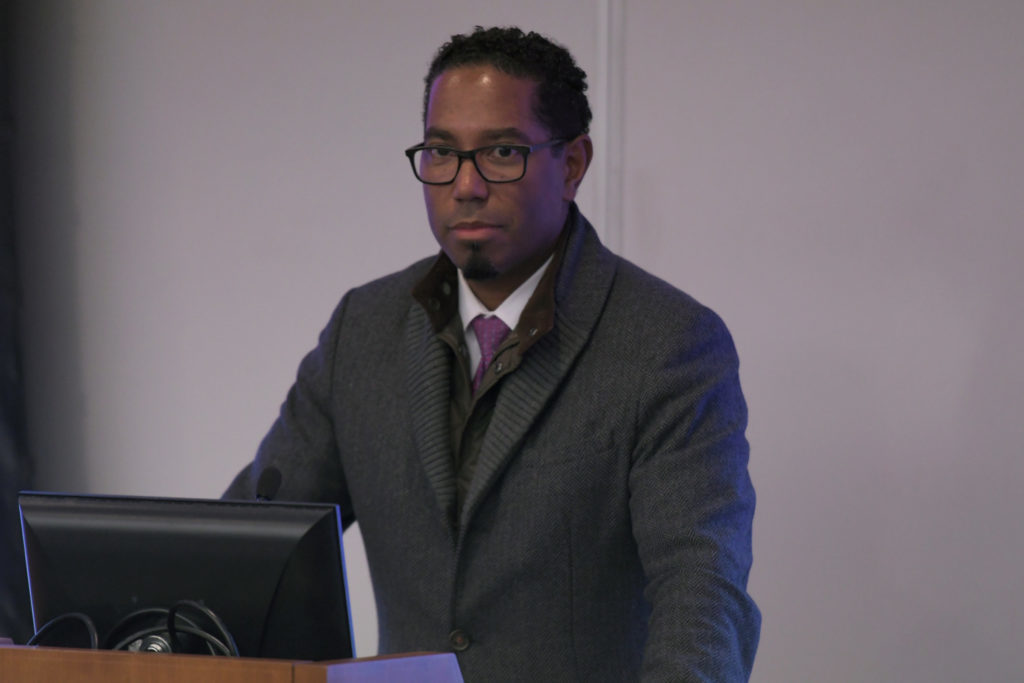A faculty committee found that dozens of faculty are receiving salaries outside of the average range in their departments.
Christopher Bracey, the vice provost for faculty affairs, presented an analysis of faculty salaries from all departments at a Faculty Senate meeting Friday, showing that about 5 to 7 percent of faculty are receiving salaries above or below the mean range. The data, compiled by the Faculty Salary Equity Committee and the Office of Institutional Research, will be presented to all schools’ deans to identify factors that may have contributed to the outliers and address the discrepancies, Bracey said.
“The question that gets asked is, ‘is there a legitimate reason why this particular faculty member appears low?’” he said. “Asking that question is left to the University administrator to review the legitimate factors that are offered to explain the salary outlier and adjust it as necessary.”
Bracey said one of the biggest challenges the committee has confronted in years past was that the committee couldn’t collect and analyze salary data fast enough to present it to schools before it became outdated. But he said the committee used a new model this year, which sorts faculty based on factors like the time they’ve been at GW and tenure status, allowing the group to evaluate the information quickly and give schools recent data.
He said there are many potential causes for faculty salary outliers, including the time faculty were hired and the status and rank of the faculty member at the time they were hired.
“The important thing is that the data provides the point of departure for this conversation about salary equity,” he said. “Also, because faculty salaries adjust on a regular basis, it is important that our statistical analysis be as current as possible if that conversation is to be a fruitful one.”
He said the provost’s office is working directly with schools like the Columbian College of Arts and Sciences and the School of Engineering and Applied Science to examine salary matters, but “more specialized” schools like the Law School and the School of Medicine and Health Sciences will review faculty salary equity with the help of an outside consultant because many of their faculty also bring in income from practicing in their field professionally.
“Through conversation with the deans, we can learn what factors may have contributed to producing that outlier salary or it may be that the outlier salary is entirely justified,” he said. “It may also be the case that an adjustment is warranted.”
Bracey said with a quicker turnaround, the administration will be able to review salaries annually. This year’s data analysis was based on information from January 2018, and the next review will be based on salary data from January 2019, he said.
“The good thing is now that we hammered out a methodology and we are pretty good about it, and I think we could run the reports fairly quickly,” he said. “The ease that we could do this suggests we could do this on a rolling basis, and that way the schools can be aware of the adjustments we have made.”
Provost Forrest Maltzman said at the meeting Friday that the committee’s findings were based on faculty members’ years of service, department and rank, and are necessary to ensure faculty have been salaried through a fair process. He said there are always outliers in data, and the administration wants to ensure outliers are present for legitimate reasons.
“That is the nature of someone’s paid at the top and somebody’s paid at the bottom,” he said. “It is worth the effort and the time to ensure that you are treating people fairly.”
Miriam Galston, an associate law professor and member of the Faculty Senate, said she served on a former committee examining salary equity, and the group took six years to formulate salary data. She said the committee never completed a review of the data because they couldn’t find a process that was fast enough to keep the data relevant.
“I want to tell you how great it is to hear that the methodology that you’ve adopted and the speed and attempt to correct with the previous efforts is fantastic,” she said.
James Tielsch, the chair of the department of global health and a member of the Faculty Senate, said at the meeting Friday that he suggests the committee also consider examining salary disparities among faculty groups in terms of gender and race and compare GW’s data to peer schools.
“One of the most important jobs of this kind of analysis is to present it to faculty to demonstrate just in terms of transparency, which is why I would strongly encourage you to look at gender and ethnicity to demonstrate to faculty who might have preconceived notions about the reasons why they are in one quartile versus another,” he said.
Shaista Khilji, a professor of human and organizational learning and a member of the Faculty Senate, said officials should have regular discussions about the definition of equity to ensure administrators are holding themselves to high standards during yearly reviews.
“What is equity today is not equity tomorrow,” she said. “What is equity for one group is not for another.”





